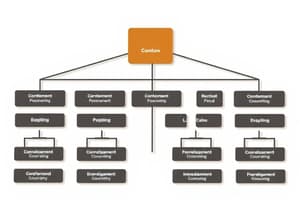Podcast
Questions and Answers
What is the primary focus of contingency theory in organizations?
What is the primary focus of contingency theory in organizations?
- Standardizing communication across all levels
- Focusing solely on internal processes
- Adapting organizational structure to external factors (correct)
- Implementing a rigid organizational structure
Which of the following best describes the mechanistic view of organizations?
Which of the following best describes the mechanistic view of organizations?
- Organizations require constant evaluation of internal dynamics
- Organizations operate as flexible entities with fluid roles
- Organizations function like machines with adjustable parts (correct)
- Organizations thrive on hierarchical and bureaucratic structures
What is a necessary action for successful organizations according to contingency theory?
What is a necessary action for successful organizations according to contingency theory?
- Focusing on external competition rather than internal issues
- Increasing the number of internal policies
- Maintaining unchanged roles and workflows
- Continuously adapting based on environmental factors (correct)
What is the implication of contingency theory regarding organizational adaptation?
What is the implication of contingency theory regarding organizational adaptation?
Flashcards
Contingency Theory Focus
Contingency Theory Focus
Adapting organizational structures to external factors.
Mechanistic View
Mechanistic View
Organizations work like precise machines with adjustable parts.
Organizational Success Formula
Organizational Success Formula
Constantly adjust to environmental circumstances.
Adapting Organization Structures
Adapting Organization Structures
Signup and view all the flashcards
Study Notes
Contingency Theory
- Organizations should adapt their structures and internal processes based on their surroundings.
- This theory emphasizes the importance of responding to changes in the external environment.
- Organizations should not operate according to a rigid model.
Mechanistic View
- Views organizations as machines.
- Each part can be adjusted based on external factors.
Restructuring for Success
- Successful organizations continuously adapt or restructure based on environmental factors.
- This includes competition and technological advancements.
- Adaptations involve adjusting strategies, roles, and workflows.
Communication in Contingency Theory
- This approach does not focus on a deep understanding of communication.
- Instead, it focuses on how communication integrates into the organizational structure.
- Communication is viewed as a response to the external environment.
Studying That Suits You
Use AI to generate personalized quizzes and flashcards to suit your learning preferences.




